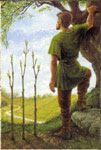Though my days seem slow and pointless right now, natures move on. Her cycles do not wait on the mood of man. Sadly, she may however, have to deal with our greed as industrialization continues to pour greenhouse gases into the atmosphere. It is funny how a principle that no one would deny when confronted by the blast furnace of a closed car in summer, is bitterly denied when we create the very same conditions on a global scale. Sad, indeed and although dreadfully important – it is not our subject today.
For we have come upon Imbolc, an ancient Celtic name for the day falling halfway between the winter solstice and the spring equinox. It is comes commonly on February 1, and it heralds- if not signs of spring, at least its approach. It is the day when the wheel of the year moves closer to the birth of spring than it is from the start of winter. In modern terms, it is the tipping point from which winter cannot long survive and spring cannot long be denied. We celebrate it as the returning of light and warmth and the fertility of nature.
This event is celebrated by earth based groups as Imbolc, by Christians as St Brigid’s day and Candlemas, as Americans as ground hog day. The celebration has deep roots and remains on the calendar of many faiths because it arises from the natural joy evoked by the return of spring.
This day was originally dedicated to the goddess Bridgid. She is known to many Celtic cultures under many names. Brigit, whose name thrives yet today in the Christian tradition as St Bridget. Brigantia, who became the persona Britannia and still today symbolizes England on seal and coin. She was also called Brede or Bride, by which name we still honor those entering marriage. She was a classic triple goddess, the divine maiden, mother and crone. However, her patronage of birth, mothers and children was the most beloved and enduring aspect and the one most venerated.
Brigit was also the goddess of Fire. On Imbolc, hearth fires where put out and relit anew as a symbol of rebirth and purification. The aspect of purification remains with us today in the custom of spring cleaning. Also, as this was after all just the promise of spring, it was also a time of weather forecasting. The Celts would seek to determine whether winter was exhausted and ready to depart or yet still full of fury. They would use various omens one of the most common was to observe whether a snake or badger would leaves its hole on that morning. This, of course, has, evolved into our groundhog day. Other methods of forecasting included a subtle method employing the crone side of Brigit’s triple role. It was thought that on this sacred day the crone would go out into the woods to gather enough firewood to last her through the remaining days of winter. If Imbolc day was bright and clear that was seen as a sign that Brigit was spending the whole day out gathering firewood and winter was to be with us longer. However, if it was cold and dark that was seen as a sign that the crone had stayed home in bed because she had already had enough wood for winter was soon to be over. While, this idea may not have advance meteorology much, it is a wonderful exercise in optimism.
The day was once celebrated by all the Celtic peoples across almost the whole width of Europe. From Ireland to Russia, homes were made clear of winter dirt and debris. Floors were scrubbed and hearths relit to prepare a fresh beginning like that of spring which was feebly but surely making its promises felt in the increasing days of light and warmth. Crosses were woven from rush or wheat and great meals served to assure all that winter would be survived and spring bounty would return. Children and the young of all creatures were cherished at this time. It was a joyous time of beginnings and fresh hope. Old mistakes and missteps were discarded and room made for new paths and new decisions.
Imbolc may not be as vital a celebration as it once was. But truly, what is these days?, commercialism, the diminution of faith, and the general view that time spent on traditional celebrations is wasted and better used for work or paid entertainment. This is sad, and a topic for another time. Let’s just close by saying: spring comes whether we celebrate or not. Life moves on through its cycles and we would all be well served if we slowed down once in a while and caught our breath. Spend a day enjoying the joys of community, the beauty of nature and the enduring cycle of time. We may have forgotten much of our ancient revels. We may have forgotten how to celebrate without paying an admission. We may have lost it, but it can be regained and much better our peace of mind would be for it. Visit with family and friends for time will separate you all too soon. Go out and sit beneath a tree, read some poetry, look at old photos, or watch birds at play– celebrate. It will come back to you – we may have forgotten much, but the trees remember.


No comments:
Post a Comment
Thank you so much for your comments. Feedback is the surest way to drive content towards areas you would like to see more of